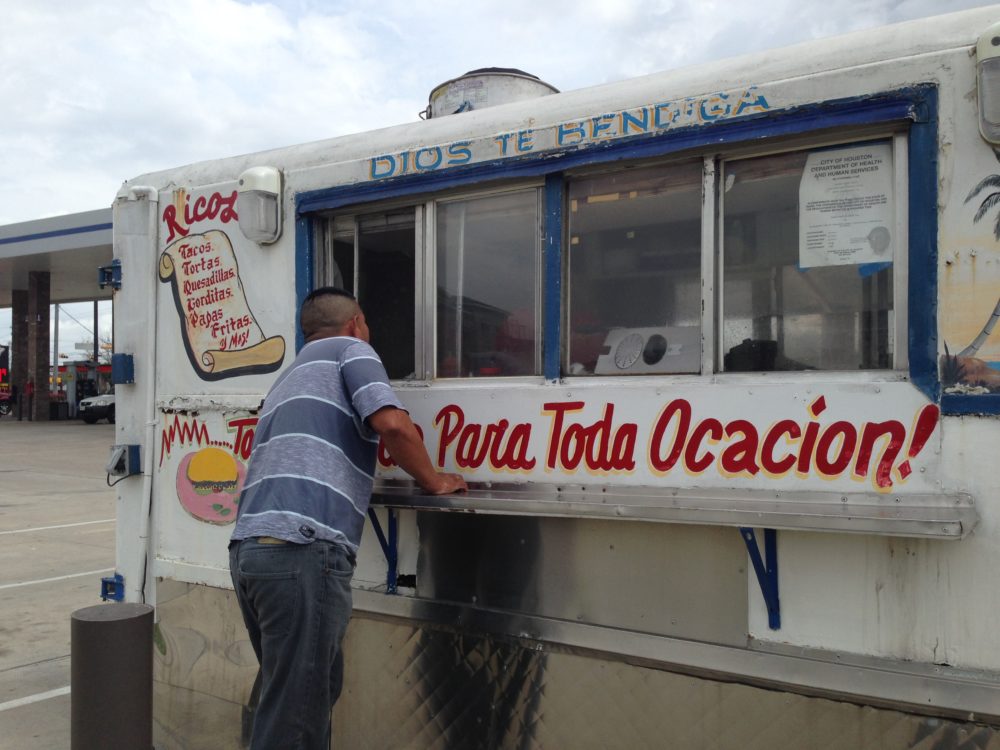
Al Ortiz/Houston Public Media
Food truck parks across Houston could soon be subject to regulations as the Houston Health Department pushes for an ordinance to hold property owners accountable for violations.
Renee Beckham, the chief sanitarian for the Houston Health Department, oversees the mobile food unit enforcement program.
“(A food truck park ordinance) will enable the vendors and also consumers to have something that’s going to be a lot more clean and maintained that we can have more accountability for,” Beckham said.
Beckham said the department is working on a food truck park ordinance modeled on those in Fort Bend County, the City of El Campo, and Shreveport, Louisiana. Among the various requirements, those ordinances call for shade and seating, restrooms, trash cans and cleanliness, adequate space between trucks and extra room for walkways. Park owners are generally responsible for following the rules.
There is no overarching ordinance for food truck parks in Houston, though individual trucks are subject to food safety and fire prevention rules.
Under the current ordinance in Houston, food trucks are inspected at least once per year. The health department’s food truck team consists of three inspectors. There are more than 1,300 permitted food trucks across the city, with 450 or more food trucks in each inspector’s jurisdiction. Beckham said the department is uncertain how many illegal, unpermitted trucks are in operation.
According to the health department’s presentation Monday to the Houston City Council’s Quality of Life Committee, from Jan. 1, 2024, through Feb. 15, 2025, food trucks racked up more than 4,300 serious food safety violations. At 991 infractions, a lack of hand-washing sinks ranked as the most common violation, followed by 709 food preparation violations, 672 equipment cleaning violations, and 625 instances of insects or rodents. There were also more than 2,800 violations of rules specific to food trucks, like travelling to a commissary to obtain food 24 hours before operation or providing employees access to a toilet.
The city’s food truck team also conducts investigations when it receives complaints. As of Feb. 19, the team had received 25 complaints about food trucks this year. The number of complaints has ticked up over the past three years from 232 in 2022 to 304 in 2024.
Violations of the food establishment code carry a fine of $50 to $2,000.
Because food trucks use propane or butane tanks, the Houston Fire Department also inspects them when they obtain permits and on a complaint-driven basis. According to HFD’s presentation to the city council committee, the chief complaints are abandoned tanks, which the department said currently doesn’t draw penalties for property owners, as well as not having enough space between trucks. If trucks are less than 25 feet apart, each truck operator can receive a citation.
“This is where the food truck park ordinance could be helpful,” HFD spokesperson Brent Taylor said. “If we had the accountability of the property owner in there, they would be responsible for ensuring the distances between the vehicles were up to par.”
In 2024, the department received only four complaints — all at the Galleria Food Truck Park in city council member Edward Pollard’s district.
“It’s been a nightmare for us for a long time,” said Paul Young, Pollard’s chief of staff, pointing to two explosions and illegal dumping.
The property owner for the Galleria Food Truck Park did not respond to Houston Public Media’s request for comment.
During the public comment section of Monday’s committee meeting, council members heard mostly from restaurant owners who spoke in favor of regulations for food trucks.
Robert Byrd, one of the partners operating the Westheimer Food Truck Park in Montrose, was the only speaker who represented the food truck industry. He advocated for a faster permitting process.
“From what I see, it’s difficult and slow for them to get through that process,” Byrd said. “If we can make that process somehow more streamlined so we could get more people in compliance, that would be good for everyone.”
Michael Shine, executive director of the Houston chapter of the Texas Restaurant Association, said members of the association have “a fairly good relationship with many of the food truck operators around the city” — but they still support additional regulations and enforcement.
“There’s a mentality that says, especially in the food truck parks, ‘I’m going to get a ticket, just bill that into the cost of business,’ if you will,” Shine said. “So it’s really about enforcement.”
Council member Julian Ramirez, who chairs the Quality of Life Committee, encouraged the health and fire departments to collaborate on crafting a draft ordinance regulating food truck parks. The departments did not provide a timeline for when they expect to present a draft to city council.